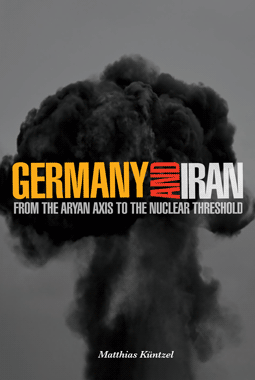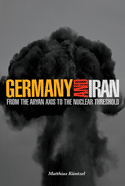By Matthias Küntzel · Monday, February 8, 2021 Matthias Küntzel is a German political scientist with a focus on the Middle East. His books with Telos Press include Jihad and Jew-Hatred: Islamism, Nazism and the Roots of 9/11 and Germany and Iran: From the Aryan Axis to the Nuclear Threshold, both of which are available in our store for 20% off the list price. His English-language website is matthiaskuentzel.net.
The days are over when Europeans only had to point to Donald Trump to legitimate their appeasement politics toward Tehran. But what will the new American administration and its European allies do to prevent Iran from getting the bomb?
Of course there is the nuclear deal with Iran. For months its proponents have been hoping for Joe Biden’s electoral victory. He would revoke Trump’s leaving the deal and loosen the sanctions on Iran; in return Iran would revise its violations of the agreements, and everything would be good again.
And now? Biden is still holding onto his controversial promise to return to the deal. He has filled the most important positions in the State Department with people who played leading roles in the negotiation of the deal under Barack Obama, including some who—like the new Iran envoy Robert Malley—proved to be particularly accommodating toward Iranian demands. And Biden has not at all insisted that the regime change its missiles program or aggression policies in response to a lifting of the American sanctions. He has only asked for one concession: that Iran return to the terms of the deal before lifting the sanctions that Trump imposed.
Continue reading →
By Saladdin Ahmed · Tuesday, December 10, 2019 Despite a decade of resistance since the Iranian Green Revolution in 2009, another Middle East and North Africa (MENA) has yet to be born. In its way lie Sunni and Shia Islamist blocs, which have been remarkably successful in preventing entire societies from stepping forward. In countries where they have assumed state power, Islamist forces have been aggressive and totalitarian, while elsewhere they have hijacked popular liberal movements of regime change in recent years. Ultimately, if the anti-Islamist resistance does not soon bring down the main sponsors of the Sunni and Shia blocs—the Turkish and Iranian regimes, respectively—the coming era will be no less bloody than the period from 1919 to 1945.
In my view, the avalanche that will topple the regime in Iran is gaining speed, but as for the Sunni bloc, I am less optimistic. The Kurds are the last obstacle to Erdoğan’s neo-Ottoman caliphate, and it seems they are being left to face their heroic yet tragic fate alone. If the Islamist momentum of militarization and mobilization is allowed to continue building, it will eventually shatter the prospects for international peace. Perhaps only then, looking back on these days, will liberal democracies recognize their own culpability for failing to support anti-Islamist struggles in the region.
Continue reading →
By Matthias Küntzel · Friday, May 24, 2019 Matthias Küntzel’s Germany and Iran: From the Aryan Axis to the Nuclear Threshold, published by Telos Press Publishing, presents an extensive and detailed historical account of German–Iranian relations from the early twentieth century to the present. Save 20% on your purchase of Küntzel’s Germany and Iran in our online store by using the coupon code BOOKS20 during checkout. The following essay has been translated from the German by Matthew J. Cooper.
As late as May 7, 2019, France sent a message to Iran’s rulers: “We do not want Tehran to announce tomorrow actions that would violate the nuclear agreement, because in this case we Europeans would be obliged to reimpose sanctions as per the terms of the agreement.”
 The admonition was futile. On the following day, exactly one year since the United States withdrew from the nuclear agreement, Iran’s President Hassan Rouhani made two things public: He announced that effective immediately the regime no longer felt bound by the central provisions of the nuclear agreement. For example, by section 7, which requires the regime to limit its inventory of low-enriched uranium to 300 kg. Also affected is section 10, according to which Iran may not manufacture or store more than 130 tons of heavy water for fifteen years. Iran will not adhere to this provision either, according to Rouhani. Heavy water is used for reactors that are specially adapted for the production of weapons-grade plutonium. These quantitative restrictions on materials needed for nuclear weapons belong to the core of the agreement that Tehran is now avowedly violating. The admonition was futile. On the following day, exactly one year since the United States withdrew from the nuclear agreement, Iran’s President Hassan Rouhani made two things public: He announced that effective immediately the regime no longer felt bound by the central provisions of the nuclear agreement. For example, by section 7, which requires the regime to limit its inventory of low-enriched uranium to 300 kg. Also affected is section 10, according to which Iran may not manufacture or store more than 130 tons of heavy water for fifteen years. Iran will not adhere to this provision either, according to Rouhani. Heavy water is used for reactors that are specially adapted for the production of weapons-grade plutonium. These quantitative restrictions on materials needed for nuclear weapons belong to the core of the agreement that Tehran is now avowedly violating.
Continue reading →
By Telos Press · Wednesday, May 22, 2019 Writing at the American Interest, Matthias Küntzel analyzes the divide between the United States and Germany regarding Donald Trump’s decision last year to withdraw the U.S. from the nuclear deal with Iran. In his book Germany and Iran: From the Aryan Axis to the Nuclear Threshold, published by Telos Press Publishing, Küntzel presents an extensive and detailed historical account of German-Iranian relations from the early twentieth century to the present, which provides essential context for understanding this split. Save 20% on your purchase of Küntzel’s Germany and Iran in our online store by using the coupon code BOOKS20 during checkout.
An excerpt from Küntzel’s recent essay:
 Trump’s decision is not without risk. Given the nature of the Iranian regime, irrational responses and war scenarios can’t be ruled out. Exactly one year after the United States left the deal, Iranian President Hassan Rouhani announced a partial withdrawal, saying Iran would keep excess enriched uranium and heavy water instead of selling it. Continuing the policy of nuclear blackmail, he threatens to resume higher uranium enrichment after 60 days. However, at least for the time being, Tehran seems not to be interested in a massive escalation. Trump’s decision is not without risk. Given the nature of the Iranian regime, irrational responses and war scenarios can’t be ruled out. Exactly one year after the United States left the deal, Iranian President Hassan Rouhani announced a partial withdrawal, saying Iran would keep excess enriched uranium and heavy water instead of selling it. Continuing the policy of nuclear blackmail, he threatens to resume higher uranium enrichment after 60 days. However, at least for the time being, Tehran seems not to be interested in a massive escalation.
Trump’s alternative approach—to put sufficient economic and political pressure on the Iranian leadership to compel it to sign a new agreement that would address not only Iran’s nuclear ambitions but also its missile program and regional warmongering—may be a long shot, but it is worth trying. Effective sanctions, however, require the cooperation of Iran’s most important trade partners, Germany and the European Union. And that is where the problem starts.
Continue reading →
By Fabrice Balanche · Friday, September 14, 2018 With the re-establishment of Bashar al-Assad’s power in Syria, the strengthening of Hezbollah in Lebanon, and finally the political and military victory of pro-Iranian forces in Iraq, it is clear that an Iranian axis now prevails in the Levant. The strength of this geopolitical axis is reinforced by the territorial continuity between Tehran and Beirut via Damascus and Baghdad: “the Iranian land bridge” or “Iranian corridor,” controlled by Iranian troops directly and by proxies. Since the Shia militias joined the Syrian-Iraqi border in May 2017, the Iranian land bridge has continued to expand, despite the U.S. troop presence on both sides, in the al-Tanef pocket and in northeastern Syria. Until spring 2017, the West seemed incredulous about this reality. However, at that time, it was already too late to block the Shiite militias in eastern Syria, and the Iranian land bridge became a reality.
Continue reading →
By Telos Press · Friday, August 31, 2018 In a new opinion piece in the Jerusalem Post, Sean Durns discusses Matthias Küntzel’s Germany and Iran: From the Aryan Axis to the Nuclear Threshold, published by Telos Press. Pick up your copy of Germany and Iran in our online store, and save 20% with the coupon code BOOKS20.
 As the German historian Matthias Küntzel detailed in his 2014 book, Germany and Iran: From the Aryan Axis to the Nuclear Threshold, close ties between the two countries go back to the pre-World War I era. As the German historian Matthias Küntzel detailed in his 2014 book, Germany and Iran: From the Aryan Axis to the Nuclear Threshold, close ties between the two countries go back to the pre-World War I era.
In the late 19th century, Persian hopes for industrial development hinged on German know-how and technological prowess. After the ascension of Kaiser Wilhelm II in 1888, “economic relations between the two countries began to expand swiftly” and “it became fashionable for young Persian intellectuals to be pro-German,” Küntzel notes.
Continue reading →
|
|




